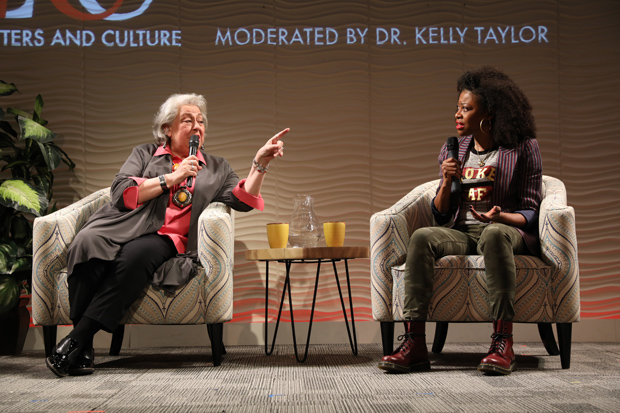An Academic Game of Thrones Plays Out in Relevance
A white feminist and a black feminist battle for supremacy in J.C. Lee’s new drama.

(© Joan Marcus)
Like the Titan Kronos, the revolution eats its children. That ancient story manifests itself in ultra-timely packaging in J.C. Lee's aptly titled Relevance, now running in an MCC production at the Lucile Lortel Theatre. It depicts the intergenerational conflict between two feminist academics, and opens with a prophetic bit of hubris uttered by the older party: "Nuance has a way of obscuring the truth."
That observation comes from Dr. Theresa Hanneck (Jayne Houdyshell), a titan of feminism. Her books have enraged and inspired a generation of women, including Msemaji Ukwell (Pascale Armand), a woman of color whose trenchant and highly personal writing has gained her a loyal online following. The play opens with a conference discussion between the two moderated by Dr. Kelly Taylor (Molly Camp), who is live-streaming the event and inviting tweets under the hashtag #LitLadies.
Theresa keeps interrupting Msemaji during the talk, leading to a rebuke from the younger woman that goes viral. Like Nomi Malone chasing Cristal Conners down the stairs, Msemaji sees an opportunity for her star to rise as she nudges her idol into early retirement. But Theresa has done her research and knows that Msemaji isn't actually who she professes to be. In a world that is obsessed with identity above all else — a world that Theresa helped to create — that information could have serious consequences if it got out, especially for Msemaji's desirability in the eyes of grant committees.

(© Joan Marcus)
Truly, every character in this play is an awful opportunist, and the performances do little to mitigate that. Richard Masur gives a sufficiently wooden portrayal of Theresa's agent, David, a two-dimensional cutout of an effortlessly privileged white man. As the play's enforcer of orthodoxy, Camp delivers her lines like a Pyongyang bureaucrat espousing praise for the dear leader. Armand brings shape and depth to her role, but no performance could overcome Msemaji's overwhelming cynicism.
Only Houdyshell manages to consistently stir our emotions, eliciting admiration, disgust, and more often, a strange mixture of the two. Counterintuitively, the harder her exterior becomes, the more sympathy we gain for Theresa, a woman who has clearly developed her scales from a lifetime in the trenches. This makes the moment her armor drops all the more jarring, akin to seeing Hillary Clinton cry.
Liesl Tommy helms a production that often feels phoned-in. Jacob A. Climer sets the pace for his on-the-nose costumes with Msemaji's first outfit: a T-shirt featuring the phrase "Woke AF." Clint Ramos's rotating set gets the job done, but its honeycomb backdrop (LED-lit by Jiyoun Chang) unfortunately reminds us of Derek McLane's set for The End of Longing, which appeared at the Lortel last summer. Jeanette Oi-Suk Yew projects a convincing Twitter storm onto that set, but her attempt to animate a hotel window looks like an Apple TV screensaver.

(© Joan Marcus)
Still, Tommy succeeds in conveying Lee's story and ideas, and there are some big ones here: The monetization of outrage, the brutality of an online culture that delights in "burning" and "dragging" its victims, and the farce of critiquing power structures while bowing to the rules of the most oppressive one of all: capitalism. Even if you don't fully buy the play's contrivance, you cannot resist feeling something about the provocative themes behind it.
Lee deserves points for bravely attempting these theatrical triple axels, even if he occasionally lands on his ass. Scenes go on much longer than they need to and when the characters get into the weeds discussing fictitious books we've never read, the play begins to resemble a staged Reddit thread. Frequent line stumbles hint at heavy last-minute revision, as this world premiere aims at the moving target of an ever-evolving digital debate.
Certainly, some critics will disparage Relevance for trying to be, well, relevant — as if it is a wasted opportunity to even attempt to bring up pertinent cultural conversations in the one space in 2018 where we are all physically together with our devices off. What they won't acknowledge is that by fearlessly theatricalizing this hyperspecific world, Lee and Tommy strike at the universal: the tension between the sated and the hungry that has been the bedrock of storytelling since ancient Greece.
More than anything, Relevance is about fear: fear of rejection, fear of time, and fear of irrelevance. We can all relate to that anxiety, but Lee leaves us with a whiff of the freedom that comes from letting go and discovering that there is a world outside of your tribe and its stultifying expectations. That's the kind of liberation that can never be expressed in 280 characters.

(© Joan Marcus)








